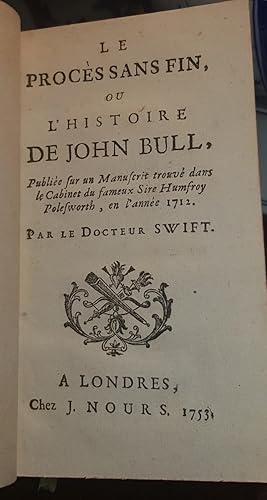procès fin lhistoire john bull de arbuthnot swift pope (2 résultats)
CommentairesFiltres de recherche
Type d'article
- Tous les types de produits
- Livres (2)
- Magazines & Périodiques (Aucun autre résultat ne correspond à ces critères)
- Bandes dessinées (Aucun autre résultat ne correspond à ces critères)
- Partitions de musique (Aucun autre résultat ne correspond à ces critères)
- Art, Affiches et Gravures (Aucun autre résultat ne correspond à ces critères)
- Photographies (Aucun autre résultat ne correspond à ces critères)
- Cartes (Aucun autre résultat ne correspond à ces critères)
- Manuscrits & Papiers anciens (Aucun autre résultat ne correspond à ces critères)
Etat En savoir plus
- Neuf (Aucun autre résultat ne correspond à ces critères)
- Comme neuf, Très bon ou Bon (1)
- Assez bon ou satisfaisant (Aucun autre résultat ne correspond à ces critères)
- Moyen ou mauvais (Aucun autre résultat ne correspond à ces critères)
- Conformément à la description (1)
Reliure
- Toutes
- Couverture rigide (2)
- Couverture souple (Aucun autre résultat ne correspond à ces critères)
Particularités
- Ed. originale (1)
- Signé (Aucun autre résultat ne correspond à ces critères)
- Jaquette (Aucun autre résultat ne correspond à ces critères)
- Avec images (2)
- Sans impressions à la demande (2)
Langue (1)
Prix
- Tous les prix
- Moins de EUR 20 (Aucun autre résultat ne correspond à ces critères)
- EUR 20 à EUR 45 (Aucun autre résultat ne correspond à ces critères)
- Plus de EUR 45
Livraison gratuite
- Livraison gratuite à destination de France (Aucun autre résultat ne correspond à ces critères)
Pays
Evaluation du vendeur
-
Le Procès sans fin, ou l'Histoire de John Bull, Publiée sur un Manuscrit trouvé dans le Cabinet du fameux Sire Humfroy Polesworth, en l'année 1712. Par le docteur Swift.
Edité par Londres, J. Nours,, 1753
Vendeur : Lascar Publishing Ltd., Hong Kong, Hong Kong
Edition originale
EUR 378,36
Autre deviseEUR 11,11 expédition depuis Hong Kong vers FranceQuantité disponible : 1 disponible(s)
Ajouter au panierHardcover. Etat : As New. No Jacket. 1st Edition. In French. Published by Nourse, fake place, London, first edition (1753) In 12, 16.5x9.5 cm wonderful leather binding, strong white paper, with gold titles, red died end papers. pp XXIII,1, 248. Jonathan Swift was famous for his Gulliver's Travels, he was a Tory supporter, against the war on the Continent and against the useless wars of the duke of Marlborough. Franch translation by the Abbé de Velly, mathematician and doctor of the Queen. It is a bitter satyre on the English strategies from the Peace of Utrecht. Querard claimed that it was written by J. Arbuthnot a friend of Swift, Gay and Pope. This book marks the birth of the quintessential British man, John Bull. (France littéraire, IX, 303. Mylne, 53.2). Ex Libris and from the library of Colonel Sir Edwin King Perkins, CBE, VD, (28 February 1855 - 8 January 1937) a British Conservative Party politician and M.P.
-
EUR 200
Autre deviseEUR 10 expédition vers FranceQuantité disponible : 1 disponible(s)
Ajouter au panierLondres, J. Nours, 1753. In-12, plein veau de l'époque, dos orné de caissons dorés, xxiii, (1), 248 p. Première édition française de la traduction de 'The History of John Bull.' donnée par l'abbé François Velly. Médecin de la reine, mathématicien et écrivain écossais, John Arbuthnot était l'ami de Jonathan Swift, Alexander Pope et John Gay, avec lesquels il fonda la célèbre société satirique: le Scriblerus Club. Cet ouvrage contient le recueil des cinq pamphlets que John Arbuthnot composa à partir de 1712, réunis et publiés par Swift et Pope. Allégorie spirituelle des manoeuvres politiques de la Grande-Bretagne, de la France, de l'Espagne et de la Hollande, qui conduisirent au traité d'Utrecht (1713), l'oeuvre met en scène, pour la première fois, la figure de John Bull, personnification de la nation britannique qui obtint un immense succès et persiste encore aujourd'hui. (France littéraire, IX, 303. Mylne, 53.2). Mors et coiffes usés, qqs manques de cuir.



